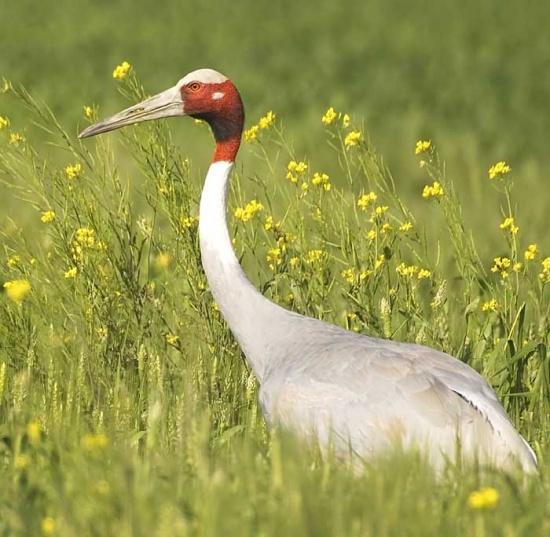| Line 1: | Line 1: | ||
| − | |||
| − | |||
;[[:Category:Grus|Grus]] antigone | ;[[:Category:Grus|Grus]] antigone | ||
| − | + | [[Image:Sarus_Crane.jpg|thumb|550px|right|Photo by '''radz'''<br>Location: Bharatpur, India]] | |
| − | [[Image:Sarus_Crane.jpg|thumb|550px|right|Photo by radz<br | ||
==Identification== | ==Identification== | ||
156cm. Grey, bare red head, white crown and a long dark pointed bill, black wing tips, long red or pink legs. The sexes are similar, but young birds are duller and browner. The male is larger than the female. | 156cm. Grey, bare red head, white crown and a long dark pointed bill, black wing tips, long red or pink legs. The sexes are similar, but young birds are duller and browner. The male is larger than the female. | ||
| Line 9: | Line 6: | ||
Northern [[Pakistan]] and [[India]], [[Nepal]], Southeast [[Asia]] and Queensland, [[Australia]]. | Northern [[Pakistan]] and [[India]], [[Nepal]], Southeast [[Asia]] and Queensland, [[Australia]]. | ||
==Taxonomy== | ==Taxonomy== | ||
| + | ====Subspecies==== | ||
| + | *''G. a. antigone'' - N India to Nepal and (formerly?) Bangladesh | ||
| + | *''G. a. sharpii'' - Cambodia and s Laos; winters in Vietnam | ||
| + | *''G. a. gilliae'' - Spottily distributed coastal n Australia (mainly Queensland) | ||
==Habitat== | ==Habitat== | ||
Freshwater marshes and plains. | Freshwater marshes and plains. | ||
| Line 15: | Line 16: | ||
It nests on the ground, laying 2-3 eggs. Both parents take turns sitting on the nest. They tend to mate for life | It nests on the ground, laying 2-3 eggs. Both parents take turns sitting on the nest. They tend to mate for life | ||
| − | |||
==External Links== | ==External Links== | ||
{{GSearch|Grus+antigone}} | {{GSearch|Grus+antigone}} | ||
*[http://www.aviceda.org/abid/birdimages.php?action=birdspecies&fid=31&bid=393 View more images of this species on the ABID] | *[http://www.aviceda.org/abid/birdimages.php?action=birdspecies&fid=31&bid=393 View more images of this species on the ABID] | ||
| − | [[Category:Birds]][[category:incomplete]] | + | [[Category:Birds]][[category:incomplete]][[Category:Grus]] |
Revision as of 02:25, 12 July 2008
- Grus antigone
Identification
156cm. Grey, bare red head, white crown and a long dark pointed bill, black wing tips, long red or pink legs. The sexes are similar, but young birds are duller and browner. The male is larger than the female.
Distribution
Northern Pakistan and India, Nepal, Southeast Asia and Queensland, Australia.
Taxonomy
Subspecies
- G. a. antigone - N India to Nepal and (formerly?) Bangladesh
- G. a. sharpii - Cambodia and s Laos; winters in Vietnam
- G. a. gilliae - Spottily distributed coastal n Australia (mainly Queensland)
Habitat
Freshwater marshes and plains.
Behaviour
They forage in shallow water or in fields, probing with their bills. The diet includes insects, aquatic plants and animals, crustaceans, seeds and berries, small vertebrates, and invertebrates.
It nests on the ground, laying 2-3 eggs. Both parents take turns sitting on the nest. They tend to mate for life




